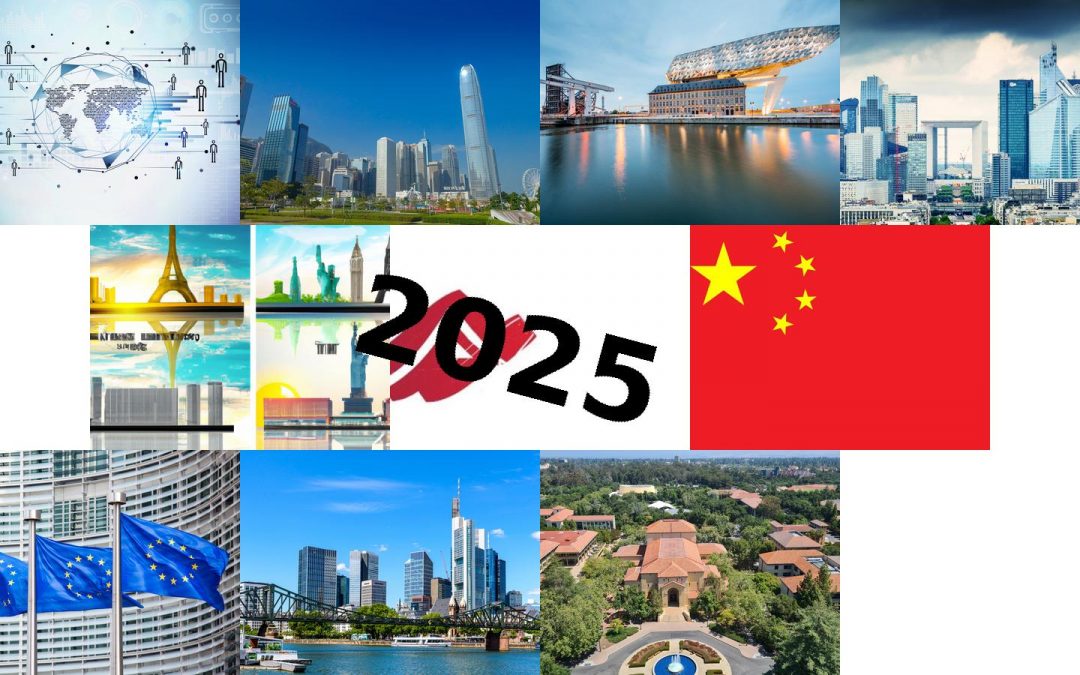Dear friends, dear clients, dear partners,
At the beginning of this new year, Alhambra International wishes you all the best for success, health, and innovation. As we step into an era of major economic, technological, and geopolitical changes, we would like to share the key trends that will continue to shape the global market in 2025.
1. The Influence of Economic Blocs
Mainland China, a key driver of the global economy, remains a strategic focus, especially in controlling value chains in the world of raw materials and its industrial applications. Investments in the technological and manufacturing industries are massive, with significant state aid but also a strong presence within the BRICS. At the same time, foreign direct investment is declining because in some areas, such as electric battery technology, China has mastered this technology so well that it does not need to attract external investors.
In contrast, U.S. companies account for approximately 30–40% of FDIs in Europe in strategic sectors such as technology, healthcare, energy, and financial services. What is new is that the American continent attracts more and more direct investment with 36% of the investment amounts captured in 2024 (20% in 2023), compared to 41% for Asia (55% in 2023).
The growing competition between economic blocs, such as the United States, the European Union, China and more generally the BRICS generates both challenges and opportunities for companies seeking to establish a presence or collaborate with these key regions.
With the rise of these blocs, companies will have to redesign their international mobility strategies and adopt policies promoting diversity and talent attraction in an increasingly competitive environment.
2. Mergers and Acquisitions (M&A) Market
In 2024, the European M&A market experienced a significant drop in transaction volume (-26% compared to 2023), due to economic uncertainties, but 2025 is set to be a year of rebound, especially with the impact of the election of Donald Trump in the United States. Investors will continue to focus on growth sectors such as technology, renewable energy, health and high value added industries, with sustainability playing a key role in investment criteria. Talent management and promotion, with the need to strengthen HR due diligence will be crucial for the success of these M&A operations.
3. Artificial Intelligence: a Catalyst for Analytical and Decision-Making Processes
Artificial intelligence (AI) is transforming analytical and decision-making processes within organizations. Leaders should understand AI’s implications and strategically prepare for its integration into various organizational functions.
In 2025, especially in the recruitment sector, we anticipate broader adoption of predictive analytics tools and advanced automation tools to identify strategic talent, analyze skills, and predict performance while enhancing the candidate experience.
Generative AI transforms recruitment processes and will increasingly serve as a co-pilot, enabling HR professionals to dedicate more time to high-value tasks such as human interaction, behavioral analysis, contract negotiation, and strategic decision-making.
4. Talent Management in a Changing World
The challenge for companies lies in identifying and retaining key leaders, especially during organizational transformations driven by M&A activities or structural changes driven by innovation—the main driver of growth. Cultural alignment, a clear vision of long-term skill requirements, and an assessment of previous experiences will be essential for identifying, selecting, and integrating talent.
5. Complexity and burden of European Regulations
International companies will continue to navigate a fragmented European legislative framework in areas such as labor law, taxation, social protection, and capital markets. The diversity of European regulations, particularly regarding layoffs and notice periods, complicates HR processes for international and mid-sized companies.
The fragmentation of capital markets does not favor the development of European venture capital funds in support of innovative start-ups and technology companies, fostering strong industrial competitiveness on the European continent.
At the same time, companies face uniform but burdensome regulations on AI, digital services, climate transition, agriculture, and sustainability. These regulations, designed for the “pre-pandemic world,” before COVID-19, before Ukraine, before the conflagration in the Middle East, before the growing rivalry between major blocs should be reviewed in favor of an “industrial pact” that promotes high-value-added production capacities in Europe.
To address these regulatory challenges, investing in expert legal teams with local compliance knowledge and proficiency in new European regulations will be essential.
6. Relationships between Companies and Recruitment Agencies
The relationships between companies and recruitment firms are sometimes complex, often due to divergences between expectations and methods. Alhambra International advocates for strategic partnerships based on transparency and co-creation of innovative solutions for tailored recruitment needs.
In a globalized but fragmented world, companies must evolve rapidly to remain competitive. As 2025 begins, we will continue to support you in exploring these trends and integrating them into your recruitment and talent management strategies. Together, we will address the challenges of this global, complex, and rapidly transforming world.
Happy New Year 2025, and may this new year bring you success!



